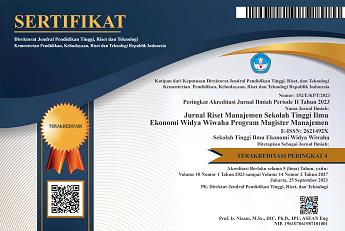EVALUASI PENGELOLAAN PAJAK BUMI DAN BANGUNAN PERDESAAN DAN PERKOTAAN: Studi pada Pemerintah Kota Yogyakarta
DOI:
https://doi.org/10.32477/jrm.v3i1.75Keywords:
Land and Building Tax, Friedman’s four-quadrant analysis, ratio analysisAbstract
The legalization of the law No. 28 Year 2009 on Regional Taxes and Levies is one of changes in fiscal policy that is quite fundamental to the implementation of regional autonomy, including the regionalization of Land and Building Tax. The implementations such as the Yogyakarta Regional Regulation No. 2 of 2011 on Land and Building Tax effectedthe very significant consequences of changes, especially on the revenue management and the administration ofLand and Building Tax. This study aims to describe the management of Land and Building Tax (PBB P2) in Yogyakarta government, by using Friedmans four quadrants analysis and ratio analysis. The result of this study is the effectiveness of the PBB P2 management in DPDPK Yogyakarta by 137.87% with very effectiveeffectiveness criteria. PBB P2 management efficiency in the first year was 2.99% with highly efficiency criteria. PBB P2revenue contribution gains 3.81% of theYogyakarta governments local revenue in 2012. Its only 0.28% with thevery low contribution criteria.PBB P2management in DPDPK Yogyakarta is based on Friedman’s four-quadrant approach in quadrant IV which is a quality quadrant of the impact. This shows a good management of tax collection againsts the potentials of PBB P2. The obstacles of PBB P2 management in DPDPK Yogyakarta include: there is no SOP of PBB P2management, assessment for NJOP reclassification, the Mayor’s regulations for NJOP, and updates of the database.
References
Adisasmita, Rahardjo (2011), Pembiayaan Pembangunan Daerah, Yogyakarta: Graha Ilmu.
Alexander, Yoseph (1996), Potensi Pajak Bumi dan Bangunan Sektor Pedesaan dan Perkotaan di Kabupaten Kapuas Hulu, Tesis S2, Universitas Gadjah Mada, Yogyakarta.
Bahl, Roy (1999), “Implementation Rules For Fiscal Decentralization”, The paper presented at the International Seminar on Land Policy and Economic Development, Land Reform Training Institute, Taiwan, November 1999, International Studies Program, School of Policy Studies, January 1999, Georgina State University, Atlanta, Georgia.
Bird, Ricard M. Bird & Francois, Vaillancourt (2000), Desentralisasi Fiskal di Negaranegara Berkembang, Jakarta: PT. Gramedia Pustaka Utama.
Davey, Kenneth (1988), Pembiayaan Pemerintah Daerah : Praktik-praktik Internasional dan Relevansinya Bagi Dunia Ketiga, Jakarta: UI Press.
Devas, Nick dkk (1989), Keuangan Pemerintah Daerah di Indonesia, Jakarta: Universitas Indonesia Press.
Halim, Abdul & Ibnu Mujib (2009), Problema Desentralisasi dan Perimbangan Keuangan Pemerintah Pusat-Daerah Peluang dan Tantangan dalam Pengelolaan Sumber Daya Daerah, Sekolah Pascasarjana UGM, 2009.
Halim, Abdul & Kusufi, Syam (2012), Akuntansi Sektor Publik, Jakarta: Salemba Empat.
Harjanto, Budi, Desentralisasi Pajak Properti Dalam Implementasi Undang-Undang Nomor 28 Tahun 2009: Pelaksanaan Transisi, Tantangan dan Harapan, Seminar Nasional Implementasi Undang-Undang Nomor 28 Tahun 2009 Tentang Pajak Daerah dan Retribusi Daerah Transisi, Tantangan dan Harapan, Yogyakarta, 6 Maret 2010.
Irianto, Edi Slamet (2012), Kebijakan Fiskal dan Pengelolaan Pajak, Yogyakarta: CV. Aswaja Pressindo.









